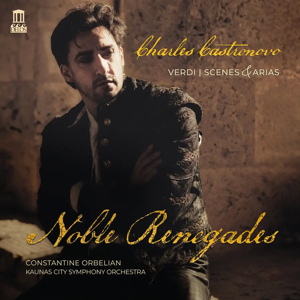
Giuseppe Verdi (1813-1901)
Noble Renegades
Charles Castronovo (tenor), Kaunas City Symphony Orchestra/Constantine Orbelian
rec. 2022, Kaunas State Philharmonic Hall, Kaunas, Lithuania
Sung texts with English translation enclosed
Delos DE3505 [56]
My MusicWeb colleague Göran Forsling has already favourably reviewed this recital and I refer you to his review to avoid unnecessarily duplicating background information about the programme already contained therein, but in brief this is an anthology of scenes with supporting singers, predominately from Verdi’s earlier operas, sung by a tenor who has already been singing for twenty-five years in the world’s major opera houses but is not yet fifty.
Charles Castronovo previously released an album of Neapolitan songs and recently Puccini: I Canti, reviewed by no fewer than three of us here (review ~ review ~ review). I have heard him live at the Royal Opera, too, and enjoyed his lyric tenor which has of late darkened but perhaps also coarsened a little; in many ways, as GF remarks, comparisons in this repertoire – if they must be made – are principally with the young Carreras who performed and recorded some of these roles under Gardelli for Philips, but Domingo and Bergonzi recorded them, too, so competition is strong.
The first item is Carlos’ opening aria from the more rarely heard original French version of Don Carlos and we may note the heft and aforementioned weightier timbre of Castronovo’s tenor. He sings good French – heard again in the penultimate item on this disc, an aria from Jérusalem. His vocal production is a tad effortful but highly dramatic and preferable to the thin, white, falsetto-biased tenors increasingly imported from baroque opera to sing heftier roles too heavy for their essential timbre. I noted in my review of the Puccini recital that the problem for me with his voice is that he does not command a wide tonal palette, so although he handles texts expressively, his voice lacks variety. It is a big, healthy animal sound but without Carreras’ plangency or Bergonzi’s gleam and at times turns shouty. Kudos to the tenor who sings the Officer in I due Foscari; he sounds little different from the star tenor. Also noticeable is the elegance and energy of the Kaunas City Symphony Orchestra conducted by Constantine Orbelian; they are by now highly experienced accompanists and provide admirable support. Little refinements, such as the clarinet solo in the orchestral introduction to track 3, add a touch of class.
I must be honest, though: the lack of tonal variety in Castronovo’s manner inclines me to revert to more individual and engaging delivery of the kind we hear from the older singers I cite above. This is solid, sturdy singing which would be welcome in any opera house and comparisons are odious, but Castronovo does not engage me as the young Carreras, Bergonzi, Domingo and Björling did, and as the recital progresses I become bored by its sameness. I take as a prime example his prosaic delivery of the great aria “Forse la soglia attinse” and think how my first acquaintance with it via Bergonzi’s delivery of it for Leinsdorf in the recording I bought as a first-year student in 1973, just discovering opera, really seized my imagination. Castronovo is doing his best, but to my ears every scene presents the same stressed and bellowing character, mostly delivered in an unrelenting mezzo-forte. His “La mia letizia infondere” hasn’t an ounce of the allure of versions by Carreras or Pavarotti – and the soprano singing Sofia in that scene from I Lombardi has a nasty edge to her voice. I could go on, but my response to each extract is the same. I hear the passion in his delivery of “Quando le sere il placido” and am sure that I would appreciate it in performance – but recordings – or perhaps even spoiled listeners – are less forgiving. The same reservations apply to the final track, the Act I scene from Il Corsaro. I made a point of playing Carreras’ version for purposes of comparison immediately after listening to Castronovo, and here was the vocal glamour and nuance missing in this new version. Carreras and Gardelli caress phrases so much more seductively than Castronovo and Orbelian. Don’t believe me? Listen for yourself on YouTube – or try Vittorio Grigolo’s version, which is almost as convincing.
Ralph Moore
Previous review: Göran Forsling (September 2024)
Buying this recording via a link below generates revenue for MWI, which helps the site remain free.



Contents
Don Carlos
1. Fontainebleau ! Forêt immense et solitaire
2. Je l’ai vue
I due Foscari
3. Qui ti rimani
4. Dal più remoto esilio
5. Del consiglio alla presenza … Odio solo, ed odio atroce 3:07
with Tomas Pavilionis (tenor)
Macbeth
6. O figli, o figli miei … Ah, la paterna mano
Un ballo in maschera
7. Forse la soglia attinse … Ma se m’è forza perderti
I Lombardi
8. O madre mia, che fa colei
9. La mia letizia infondere
10. Oh ! ma pensa, che non puoi
11. Come poteva un angelo
with Kristin Sampson (soprano)
Luisa Miller
12. Il foglio dunque?
13. Quando le sere al placido
14. Di me chiedeste
15. L’ara, o l’avello apprestami
with Tomas Pavilionis (tenor), Tadas Girininkas (bass) and the Kaunas State Choir
Jérusalem
16. L’infamie ! Prenez ma vie!
Il corsaro
17. Ah, sì, ben dite

















